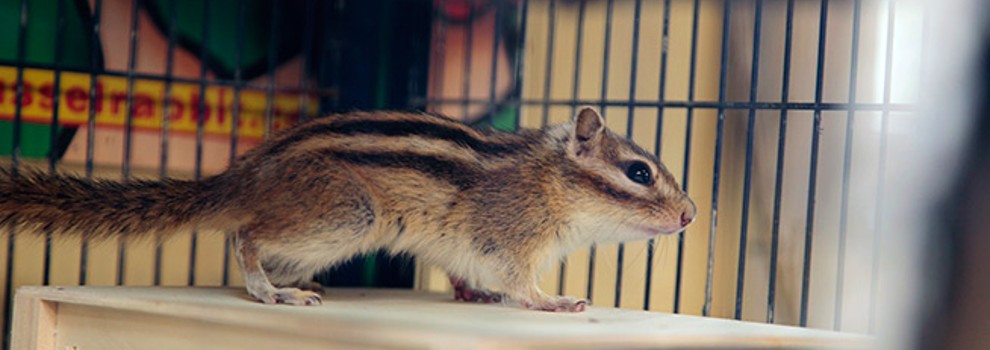- Find a Pet
- Advice and Welfare
- Ways to Give
- Get Involved
- What We Do
- Search
- My RSPCA
- Report a concern
- Sponsor
-
Colour modeVivid Calm
- Home
- Advice and welfare
- Pets
- Rodents
- Chipmunks
- Health and Welfare
Chipmunk health and welfare
Regularly watching your chipmunks and how they normally behave will help you notice when they're behaving differently, which can be an early sign that something's wrong. Here's how to monitor your chipmunks' health and what signs to look out for.

How to check your chipmunks' health
Healthy chipmunks should be lively, with a shiny coat, bright eyes and no signs of diarrhoea around the tail. Signs your chipmunk may be unwell may include:
- Discharge - around the nose
- Difficulties breathing - a sign of a possible respiratory infection
- Wetness around the mouth - a possible sign of overgrown teeth
It's worth brushing up on the signs and symptoms associated with common illnesses in chipmunks, such as aspergillosis, ringworm, parasites, stress, dental disorders and respiratory infections.
Also watch out for your chipmunks developing repetitive behaviour, which may be caused by barren environments, stress, frustration or lack of mental stimulation. Consult your vet if they show any signs of illness or stress.
Keeping your chipmunks healthy
To keep your chipmunks happy and healthy:
- Only use prescribed medicines - only treat them with the medicines recommended by a vet. Human and other animal medicines can be dangerous to chipmunks, so you should never use them.
- Keep them away from poisonous materials such as poisonous food, plants, and chemicals. Always contact your vet immediately if you suspect poisoning.
- Give them suitable gnawing material, such as a cuttlefish bone, which will help wear down their continuously growing teeth. Check their teeth weekly for any signs of overgrowth or misalignment. Only vets should correct overgrown or misaligned teeth.
- When you're away, ensure that your pets are cared for by a responsible person. It's best to keep them in their familiar enclosure and leave them their usual food.
- Always supervise all your pets when they're in the company of another animal or person who could deliberately or accidentally harm or frighten them.
Taking your chipmunk to the vet
If your chipmunk shows any signs of being unwell, including changes to their behaviour, always seek the advice of your vet. If your vet asks you to bring them into the surgery, take a look at our advice for moving your chipmunk.



